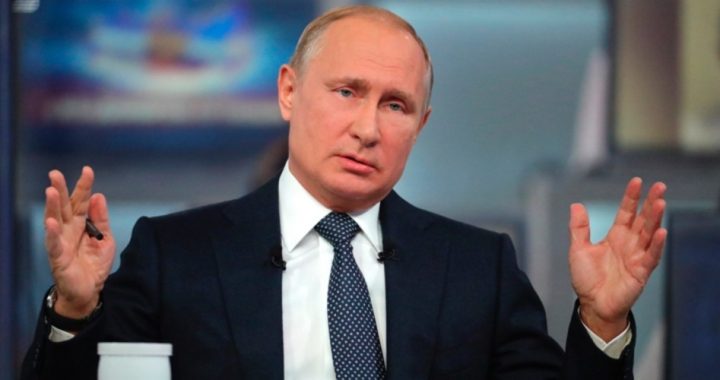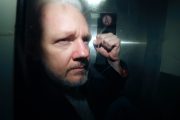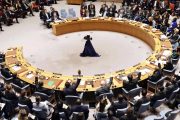
As tensions between Russia and the West are reaching all-time post-Cold War highs, Russian President Vladimir Putin warned that “a third world war could be the end of civilization” and said that “should restrain” nations “from taking extreme steps on the international arena that are highly dangerous.” His remarks were aimed at U.S. policies under the administration of President Trump.
Responding to a question from a caller during his annual phone-in — wherein he answers questions from the public — Putin recalled the famous quote from Albert Einstein, who said, “I know not with what weapons World War III will be fought, but World War IV will be fought with sticks and stones.”
The Russian dictator went on to say, “The understanding that a third world war could be the end of civilization should restrain us from taking extreme steps on the international arena that are highly dangerous for modern civilization.” He went on to tout the supposed advantages of mutually assured destruction, declaring, “The threat of mutual destruction has always restrained participants of the international arena, prevented leading military powers from making hasty moves, and compelled participants to respect each other.”
Mutually assured destruction (MAD) — the theory that nations with nuclear weapons are restrained from behaving aggressively toward other nations armed with nuclear weapons for fear that the resultant nuclear war would leave both nations in a state of destruction — is an idea that was much talked about during the Cold War. That Putin is reinserting MAD into the conversation now is not a good sign. MAD is perhaps the most apt acronym for a theory that holds that peace comes through the threat of annihilation.
That Putin’s remarks were aimed at the West in general and the United States in particular is clear from his statements that “U.S. withdrawal from treaties on anti-ballistic missiles is an attempt to put an end to strategic parity, but we will respond to this” and “We believe that the unilateral introduction of all kinds of sanctions does not resolve problems, it only worsens them.”
So, Putin — who has seen Russia’s already-strained relationship with the West break down even further over issues related to the Crimea, Syria, the poisoning of former Russian military intelligence officer (and double agent for the U.K.) Sergei Skripal, along with the ongoing build-up of NATO — has brought up the spectre of MAD, insinuating the possibility of a nuclear World War III, saying that Russia “will respond” to “U.S. withdrawal from treaties on anti-ballistic missiles is an attempt to put an end to strategic parity.”
There is little room for doubt — even in the most naïve and Utopian minds — that Cold War 2.0 is here and now. Even UN Secretary General António Guterres admits as much. In April, The Guardian reported that “amid concerns about a US-led military strike in the Middle East” and “previously classified intelligence making fresh claims about the nerve agent attack [on Sergei Skripal and his daughter] in Salisbury, including that Russia had tested whether nerve agents could be applied to door handles,” Guterres said, “the cold war is back with a vengeance.”
With the build-up of both NATO and the Russian military in the region in the wake of Russia’s annexation of Crimea in 2014, each side claims their actions are a response to the other’s. That military build-up and the accompanying tensions have only increased in recent months as the Russian Bear continues to flex its muscles. Given the precarious balance — and the tendency of nations to “choose sides” — Cold War 2.0 could quickly escalate into WWIII — and the threat of nuclear war and mutually assured destruction are not far behind.
Photo: AP Images




